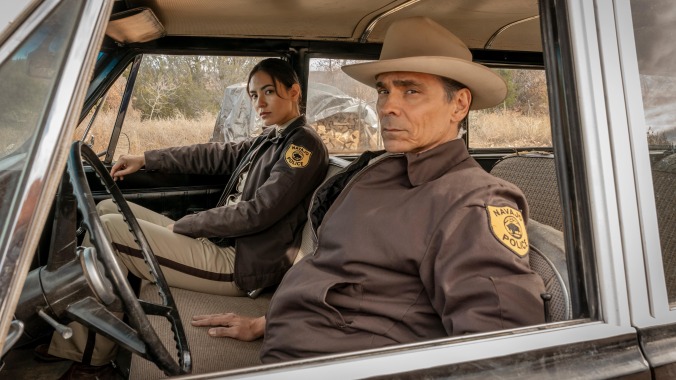Dark Winds season 2 review: The Western noir makes a creepy, edge-of-your-seat return
In the AMC show's stronger second outing, Zahn McClarnon proves yet again that he's a force to be reckoned with

Dark Winds contains some beautiful parallels, with its balmy Southwest landscape, full of sunshine and vastness, contradicting its characters’ internal and restrictive gloom. In season two, which premieres July 30 on AMC, the show also focuses on cosmic events, like a solar eclipse and the moon landing, the latter a monumental sign of progress for humanity that’s antithetical to the discrimination and close-mindedness in the Navajo Nation during the late ’60s and early ’70s. Dark Winds expertly handles these dualities, and these six new episodes, while more sinister and heavy than the show’s first season, are also somehow hopeful, pieced together by sensational actors, writers, and crew members. This time, everything clicks into place better.
The psychological thriller made a riveting, under-the-radar debut last year, sure, but it returns with a fearless approach here. It’s more straightforward, dutifully focusing on the protagonists instead of getting distracted by meandering subplots. (Mainly, there are no FBI foes or corrupt, funny car dealers in sight.) Based on Tony Hillerman’s Leaphorn & Chee novels, specifically People Of Darkness, the show puts its own twists on the source material. The result is a tightly wound, emotional, and action-packed second season. The parallels continue because, despite the breakneck pace, Dark Winds still gives everyone room to breathe and process the events, including the audience. It’s easily one of the most effective noir Westerns of recent times.
The season premiere wastes no time establishing an intriguing suspense, opening with a black-and-white scene of police lieutenant Joe Leaphorn (Zahn McClarnon) and officer Bernadette Manuelito (Jessica Matten) facing off against their Terminator-like enemy in the dark. Dark Winds turns back time to a few days before, untangling the complex web that led them to a barren piece of land in a shoot-out. The show wisely teams up Joe and Bernadette instead of only spotlighting Joe’s mentor-mentee bond with Jim Chee (Kiowa Gordon). It allows McClarnon, a masterful performer, and Matten, the breakout star, to be subtle and affecting.
This doesn’t mean ex-cop Chee is gone for long. He returns as a private investigator, taking on a wealthy client who tasks him with recovering her husband’s missing safe. Of course, nothing is as simple as just retrieving a box. His case collides fairly quickly with the bombing and deaths his former colleagues are investigating in their Navajo county town of Kayenta. The trio finds themselves in a larger conspiracy involving an age-old cult, selfish rich white folks, potential mystical elements, and an active murderer. Like any inspired Western, the themes of revenge and destruction loom large, along with an unkillable villain. The show’s layered dramatic beats are never forced or, worse, boring.
